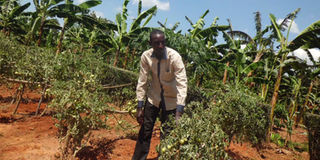Tayebwa finds gold mine on compound

Tayebwa fends his passion fruit garden. He also grows tomatoes. Photo by Denis Bbosa
What you need to know:
- A Mubende farmer turned his compound into a farm to adapt to climate change challenges, writes Lominda Afedraru
It is early morning and most farmers in Kiganda Village in Mubende District have left their homes to go and tend to the farms a routine work they often do to earn a living.
Garden of Eden
However, for Steven Tayebwa, this is not the case since his farm is within his homestead where he has turned his compound into the Garden of Eden growing assorted types of crops and vegetables to get a quick source of income.
Tayebwa, aged 40, is family man with six children who are all primary school going. Previously he has been a pastoralist keeping local herds of cattle as a major source of income.
He was also growing the East African highland banana (matooke) but paying less attention to it because he considered cattle rearing the most important.
Starting
“I started growing the cooking banana (matooke) and maize nine years ago but I was not very serious about it because I was not following the right agronomic practices to get good yields. This is because I considered cattle rearing the most important yet I could not earn better income out of it since the animals comprised local breeds, not good enough for milk production,” says Tayebwa.
How he diversified
However, in 2016 Tayebwa, after obtaining sensitisation from civil society organisation, Community Care for Development Uganda (C-Care), whose personnel was implementing agricultural innovative technologies on behalf of Food and Agriculture Organisation (FAO), Ministry of Agriculture and Ministry of Water and Environment, his approach of practicing agriculture changed.
Tayebwa and other farmers in the village were sensitised on practising good agronomy, which included among others, digging contours in their farms for absorption of rain water in the soil, mulching, application of cow dung manure to make the soil fertile and practicing kitchen gardening within a farm for growing vegetables as a way of catching a bird with two stones.
Compound farming
Tayebwa and his wife Merabu quickly turned their two-acre homestead compound into a farm.
Previously, they grew a few stalks of Napier grass to feed their animals but this time round they are growing, cow peas, cabbages, onions, tomatoes, water melon and eggplant on their compound.
The family previously wasted the cow dung obtained from their cattle but this time round, they are using it as manure in their farm.
Apart from the compound farming, Tayebwa’s family has apportioned two acres of land each to grow maize, sweet potatoes and bananas.
Harvesting water
Since the village faces a challenge of prolonged drought, part of the sensitisation package was to give farmers water tanks for harvesting rain water which they can use for irrigation during dry spells.
Mr Tayebwa is a beneficiary; he was given water tank comprising 10 cubic litre capacity which has reduced the water shortage challenge.
Ministry of Water and Environment with financial support from FAO has constructed a community solar powered valley tank with capacity to store 10,000 cubic litres of water where Tayebwa is a beneficiary. When he runs short of water from his tank, the family can still obtain water from the community valley tank for home use, animals and for irrigating their crops.
Farmers take the responsibility of maintaining the valley tank and they have hired a village security guard to take care of the valley tank and control its use by beneficiary farm communities in the village.
Livestock
He has since acquired 20 heads of cattle which are a cross breed, giving relatively better milk production. His daily income has generally increased.
From selling farm produce grown on the compound, he is able to get Shs20,000 each day.
Tayebwa and family are also practicing improved post-harvest handling, especially for the maize harvests because they have established a maize crib where they store their produce.
This, he says, helps in controlling post-harvest losses, thereby improving the maize output harvested.
The family has joined a group saving scheme and they belong to Twekembe Twezimba farmer field school were they are able to save about Shs40,000 per week.
In the last saving cycle his family was able to obtain Shs800,000 as dividend.
According to Tayebwa, he is now better off engaged in mixed farming because he is able to get money to pay school fees for his children, which was not the case before.
He advises particularly the youth to embrace farming and adopt technologies which can improve their farm output because this way, they will be in position to be job creators instead of job seekers.
He further advises farmers not leave their home compounds idle but rather practise some farming on them in order to get extra income.
Tips
Position the water tank correctly. Water tanks are best positioned on the side of the house that receives the most shade, to allow collected rainwater to maintain an even temperature.
Maximise your rainwater use. Use your rainwater regularly so that your water tank is not too full to harvest when it rains.
If rainwater is mostly used for your garden alone, your water tank will remain full and unused during the winter months when your garden does not require watering.




